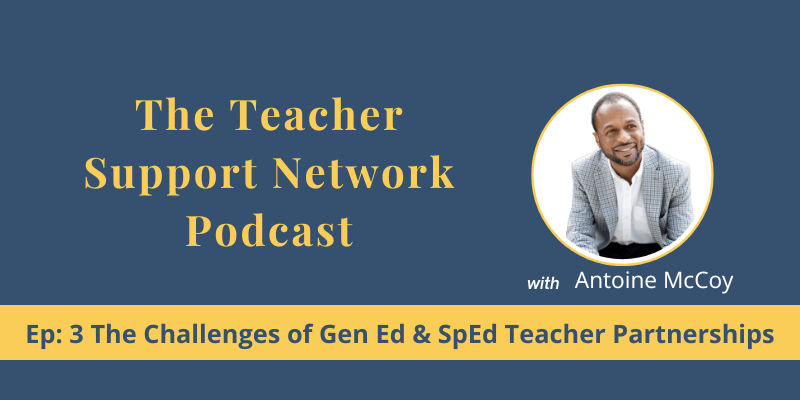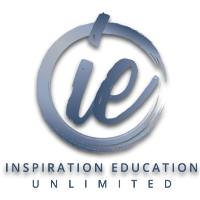
In this episode ~
We explore the barriers and challenges faced by general and special education teachers in their collaboration efforts.
The discussion highlights three primary challenges: time constraints, differing teaching philosophies and styles, and insufficient practical training.
The episode provides practical solutions and encourages proactive steps to overcome these challenges, emphasizing the importance of consistent communication, compromise, and seeking professional development.
Download the Gen Ed and SPED Teacher Collaborative Conversations Guide in the resource section below to help support you in fostering intentional conversations with your fellow teacher colleagues.
Listen in~
00:00 Introduction to Teacher Support Network
00:19 Overview of Collaboration Challenges
01:01 Time Constraints in Teacher Collaboration
03:10 Divergent Teaching Philosophies & Styles
05:55 Insufficient Practical Training
08:50 Reflecting on Collaboration Challenges
09:55 Conclusion and Resources
Useful Resources:
Download Gen Ed & SpEd Teachers Collaborative Conversations Guide here.
Join my Newsletter for a weekly dose of practical strategies, tips, resources and inspiration to support you on your teaching journey here.
Let's Get Social
Transcript
Hey everyone. Welcome to the Teacher Support Network, your go to podcast for helping busy teachers and educators like yourself create more inclusive classrooms, foster effective teacher collaboration, and focus on your own well being in the process. I'm your host, Antoine McCoy. And today in this episode, we will be diving into the barriers and challenges that stand in the way of effective teacher collaboration between General Education and Special Education teachers.
Let's get it started. In the last episode, we looked at three benefits of collaboration between Gen Ed and SpEd teachers. If you weren't able to listen to that episode, be sure to check it out when you get a chance. Today we're going to break down three common challenges Gen Ed and SpEd teachers face when collaborating and working together to support students with disabilities in the classroom.
Let's start with what I think is one of the biggest challenges teachers face and that is one of time or rather the lack of it. You and I both know that teachers have some of the busiest jobs out there in the professional world and there's usually more to do in a school day than time actually allows.
Let's look at some of the important activities that consume your time throughout the school day. First there’s your teaching schedule. You may be teaching different subjects throughout the school day, as an elementary teacher, or teaching through different class periods or blocks as middle and high school teachers.
Next, you may have grading, lesson planning, IEP meeting prep, the actual IEP meetings, case management, and other tasks like emails, staff meetings, and other committee meetings you may be a part of. I think you get the picture. So finding time for General Ed and and SpEd teachers to communicate about student needs, discuss co-teaching lessons and plans (if that's your school model), and so forth, sometimes seems impossible.
And yes, you may try to do it on the fly like I used to do while passing each other in the hallway or in the staff room while getting your mail or maybe making photocopies. But we all know that's not the most effective way to communicate or have deeper focus conversations about our students with disabilities.
So what is one way to fix this? Both teachers have to look at their schedules, you have to both look at your schedules and see where you can carve out some times where both of you can meet and preferably do it on a somewhat consistent basis, because consistency will make it even better. Even if it's just for 15 to 20 minutes of a block of time, be really intentional with your time during the meeting.
Determine what the meeting is going to be about, who or what you're going to be focusing on, and then come up with a proactive solution to support a student or students in a way that they need it.
Now let's talk about another common challenge to General Ed and SpEd teacher collaboration. The challenge is having different teaching philosophies and styles of teaching.
So this one can feel a little more personal because each teacher brings their own ideas, beliefs, and style to what works for their students in the classroom. And at times those beliefs and teaching styles sync with each other. At other times it really can really clash. Some areas where I have seen conflicts arise with teachers is in co-teaching situations around behavior management.
One teacher may be more structured and the other more relaxed. Sometimes I've seen it in instructional styles where one teacher may have a more structured, direct, individualized, instructional approach and the other teacher may like doing small groups and hands-on project-based learning.
Even teachers sometimes have unclear roles and responsibilities that are not defined within a classroom and that can cause confusion and lead to tension. This can happen between Gen Ed and SpEd teachers, but it also can happen with instructional assistants and support staff that work with you as well.
There's no easy answer to this challenge. The key is really to just have honest, real conversations about your teaching beliefs and styles. Remember in the last episode on the benefits of collaboration, we discussed how sometimes our differences in training and expertise was a real asset in how teachers can learn from one another and gain new strategies and perspectives that really benefit all students.
So, the question to consider for both teachers is this. How can you both align your teaching approaches, philosophies, and styles to create more consistent positive experiences for your students and improve their learning in the process? Remember, Gen Ed and SpEd teacher collaboration is about compromise.
and shared vision for the benefit of not your students, not my students, but our students (going back to that inclusive mindset we talked about in the first episode). It will take time and patience. That is why taking time and finding time in your schedule to address these concerns, if they arise, is so crucial.
Try to find that time where you can talk about your differences and see how you both can work together to be an asset for your students and each other, rather than a source of tension.
Now let's address the third and last teacher collaboration challenge we are going to discuss in this episode, which is insufficient practical training.
Often when inclusive education happens in our schools, it's done with the intention of supporting students with special needs with their non disabled peers so they can thrive and succeed. But often Gen ed and Sped teachers, and even support staff lack the proper training needed to implement these inclusive practices and strategies in their classrooms
how to co-teach effectively.
It's like merging two different environments and groups of teachers together and asking them to make the relationship work for the sake of the kids with little, to no support or training in that area.
Now this is not true in all school environments. Many schools and districts do offer more formal training and collaboration planning time in their schools for professional development. But that isn't the case everywhere because I have worked within schools myself and with teachers who desire more training and support, along with planning time to collaborate together, but it isn't available.
They feel like they're alone or you can feel like you're alone and you have to figure it out for yourself. This is often a very defeating place to be in because you desire to have the tools and confidence to support your students the best way you can. This one is hard because there's no easy answer to this challenge.
There are many factors that play into it. Sometimes it's above and beyond what you can always do. So here's what I recommend in terms of trying to address this challenge. Request ongoing professional development from your admin in this area. Go to them and say, ‘’hey, our team needs support in this area. What kind of professional development can be done within our school or in a staff meeting.
If that doesn't always work, seek it out yourself. There's places and areas that can do that. One of the reasons why I'm doing this podcast is really to help support you in this area. So hopefully this podcast could be a resource for you as well. Also, finding a trusted mentor and coach that can give you and your teaching team guidance and support is another way you can go as well.
What I would say is this… Be proactive in what you do. Sometimes you have to seek out the training that you need and the people who can help and who want to help, don't always know what you need. So be proactive, join with your teammates and just don't give up hope because I think it's worth striving for getting the support and the training you need so that you can really make inclusion and collaboration with your colleagues work.
So as you can see, there are many benefits to Gen Ed and SpEd teacher collaboration for the academic and social growth of your students. There are also some real challenges and barriers that make collaboration complicated and hard at times. I think as educators, it's important to explore these challenges to teacher collaboration and reflect on the ways they impact your teaching practice.
So as we wrap up this episode for the Teacher Support Network, I want you to take a moment now or this week and reflect on these two questions. First, which of these three teacher collaboration challenges discussed in this episode really resonates with you at this time and why?
Second, what is one small action step you can take to address the main challenge that resonated with you in this episode? Think about those things and take one small action step to try to address it.
So that's it for today's episode. One way to bridge the communication gap between Gen Ed and SpEd teachers is to begin by having focused conversations with each other around and about your inclusive practices, co-teaching, and so forth.
I have a free resource for you called the Gen Ed and SpEd Teacher Collaborative Conversations Guide. It will give you 10 conversation starters that will guide you in supporting students with special needs in the mainstream classroom.
You can find a link to the short guide in the resource section of the show notes for this episode. Also be on the lookout for upcoming workshops that I will be conducting that will help support you in this area.,
If you found this helpful or you know anyone who could benefit from the message, please share this episode with your fellow teacher and educator. It will help to get the message out to those who desire it and need it. So that's it for now. Thanks for listening. Until next time, take care and be encouraged.
Rate, Review, & Subscribe on Apple Podcasts
Enjoy this episode?
Please consider rating and reviewing the podcast! Your support helps me support more teachers - just like you - create inclusive classrooms, foster effective teacher collaboration, and find balance with the demands of teaching in and outside of the classroom
It's easy! Click here, scroll to the bottom, tap to rate with five stars, and select "Write a Review." I'd love to know what was the most helpful or encouraging about the episode!
While you're there, you can subscribe to the podcast if you haven't already. If you're not subscribed, you may very well miss out on future episodes. 🙂 Subscribe now!
